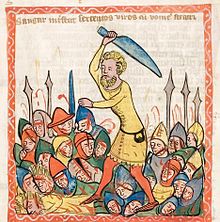The Book of Judges is the seventh book of the Hebrew Bible and the Christian Old Testament. In the narrative of the Hebrew Bible, it covers the time between the conquest described in the Book of Joshua and the establishment of a kingdom in the Books of Samuel, during which biblical judges served as temporary leaders.

Shamgar, son of Anath, is the name of one or possibly two individuals named in the Book of Judges. The name occurs twice:
- at the first mention, Shamgar is identified as a man who repelled Philistine incursions into Israelite regions, and slaughtered 600 of the invaders with an ox goad ;
- the other mention is within the Song of Deborah, where Shamgar is described as having been one of the prior rulers, in whose days roads were abandoned, with travelers taking winding paths, and village life collapsing.
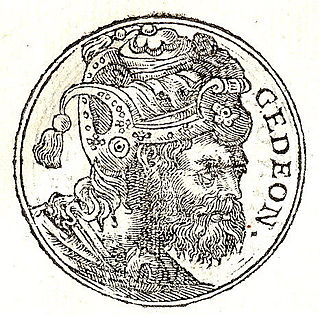
Gideon also named Jerubbaal and Jerubbesheth, was a military leader, judge and prophet whose calling and victory over the Midianites are recounted in Judges 6–8 of the Book of Judges in the Hebrew Bible.

According to the Book of Judges, Deborah was a prophetess of God, the fourth Judge of pre-monarchic Israel and the only female judge mentioned in the Hebrew Bible. Many scholars contend that the phrase, "a woman of Lappidoth", as translated from biblical Hebrew in Judges 4:4 denotes her marital status as the wife of Lapidoth. Alternatively, "lappid" translates as "torch" or "lightning", therefore the phrase, "woman of Lappidoth" could be referencing Deborah as a "fiery woman." Deborah told Barak, an Israelite general from Kedesh in Naphtali, that God commanded him to lead an attack against the forces of Jabin king of Canaan and his military commander Sisera ; the entire narrative is recounted in chapter 4.
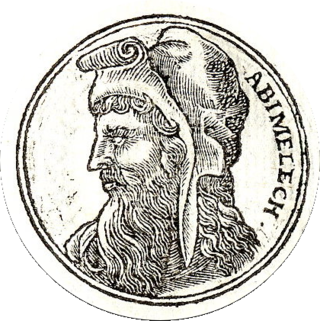
Abimelech or Abimelek was the king of Shechem and a son of biblical judge Gideon. His name can best be interpreted as "my father is king", claiming the inherited right to rule. He is introduced in Judges 8:31 as the son of Gideon and his Shechemite concubine, and the biblical account of his reign is described in chapter nine of the Book of Judges. According to the Bible, he was an unprincipled and ambitious ruler who often engaged in war against his own subjects.
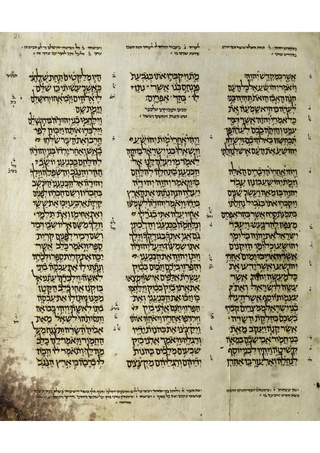
Judges 1 is the first chapter of the Book of Judges, the seventh book of the Hebrew Bible or Old Testament, a sacred text in Judaism and Christianity. With the exception of the first verse, scholars have long recognised and studied the parallels between chapter 1 of Judges and chapters 13 to 19 in the preceding Book of Joshua. Both provide similar accounts of the purported conquest of Canaan by the ancient Israelites. Judges 1 and Joshua 15–19 present two accounts of a slow, gradual, and only partial conquest by individual Israelite tribes, marred by defeats, in stark contrast with the 10th and 11th chapters of the Book of Joshua, which portray a swift and complete victory of a united Israelite army under the command of Joshua.

Othniel was the first of the biblical judges. The etymology of his name is uncertain, but may mean "God/He is my strength" or "God has helped me".
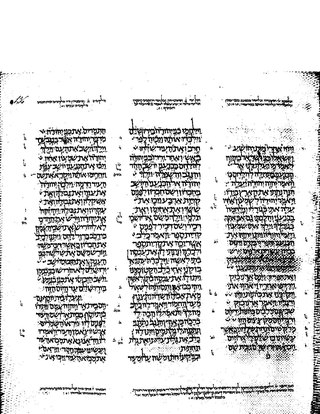
Judges 21 is the twenty-first chapter of the Book of Judges in the Old Testament or the Hebrew Bible. According to Jewish tradition the book was attributed to the prophet Samuel, but modern scholars view it as part of the Deuteronomistic History, which spans in the books of Deuteronomy to 2 Kings, attributed to nationalistic and devotedly Yahwistic writers during the time of the reformer Judean king Josiah in the 7th century BCE. This chapter records the war between the tribe of Benjamin and the other eleven tribes of Israel, belonging to a section comprising Judges 17 to 21.

Judges 3 is the third chapter of the Book of Judges in the Old Testament or the Hebrew Bible. According to Jewish tradition the book was attributed to the prophet Samuel, but modern scholars view it as part of the Deuteronomistic History, which spans the books of Deuteronomy to 2 Kings, attributed to nationalistic and devotedly Yahwistic writers during the time of the reformer Judean king Josiah in 7th century BCE. This chapter records the activities of the first three judges, Othniel, Ehud, and Shamgar, belonging to a section comprising Judges 3:1 to 5:31.

Judges 4 is the fourth chapter of the Book of Judges in the Old Testament or the Hebrew Bible. According to Jewish tradition the book was attributed to the prophet Samuel, but modern scholars view it as part of the Deuteronomistic History, which spans the books of Deuteronomy to 2 Kings, attributed to nationalistic and devotedly Yahwistic writers during the time of the reformer Judean king Josiah in 7th century BCE. This chapter records the activities of judge Deborah, belonging to a section comprising Judges 3:1 to 5:31.

Judges 5 is the fifth chapter of the Book of Judges in the Old Testament or the Hebrew Bible. According to Jewish tradition the book was attributed to the prophet Samuel, but modern scholars view it as part of the Deuteronomistic History, which spans the books of Deuteronomy to 2 Kings, attributed to nationalistic and devotedly Yahwistic writers during the time of the reformer Judean king Josiah in the 7th century BCE. This chapter records the activities of judge Deborah, belonging to a section comprising Judges 3:1 to 5:31.

Judges 6 is the sixth chapter of the Book of Judges in the Old Testament or the Hebrew Bible. According to Jewish tradition the book was attributed to the prophet Samuel, but modern scholars view it as part of the Deuteronomistic History, which spans in the books of Deuteronomy to 2 Kings, attributed to nationalistic and devotedly Yahwistic writers during the time of the reformer Judean king Josiah in 7th century BCE. This chapter records the activities of judge Gideon, belonging to a section comprising Judges 6 to 9 and a bigger section of Judges 6:1 to 16:31.

Judges 7 is the seventh chapter of the Book of Judges in the Old Testament or the Hebrew Bible. According to Jewish tradition the book was attributed to the prophet Samuel, but modern scholars view it as part of the Deuteronomistic History, which spans in the books of Deuteronomy to 2 Kings, attributed to nationalistic and devotedly Yahwistic writers during the time of the reformer Judean king Josiah in 7th century BCE. This chapter records the activities of judge Gideon, belonging to a section comprising Judges 6 to 9 and a bigger section of Judges 6:1 to 16:31.

Judges 8 is the eighth chapter of the Book of Judges in the Old Testament or the Hebrew Bible. According to Jewish tradition the book was attributed to the prophet Samuel, but modern scholars view it as part of the Deuteronomistic History, which spans the books of Deuteronomy to 2 Kings, attributed to nationalistic and devotedly Yahwistic writers during the time of the reformer Judean king Josiah in 7th century BCE. This chapter records the activities of judge Gideon, belonging to a section comprising Judges 6 to 9 and a bigger section of Judges 6:1 to 16:31.

Judges 9 is the ninth chapter of the Book of Judges in the Old Testament or the Hebrew Bible. According to Jewish tradition the book was attributed to the prophet Samuel, but modern scholars view it as part of the Deuteronomistic History, which spans the books of Deuteronomy to 2 Kings, attributed to nationalistic and devotedly Yahwistic writers during the time of the reformer Judean king Josiah in 7th century BCE. This chapter records the activities of judge Gideon's son, Abimelech. belonging to a section comprising Judges 6 to 9 and a bigger section of Judges 6:1 to 16:31.

Judges 10 is the tenth chapter of the Book of Judges in the Old Testament or the Hebrew Bible. According to Jewish tradition the book was attributed to the prophet Samuel, but modern scholars view it as part of the Deuteronomistic History, which spans in the books of Deuteronomy to 2 Kings, attributed to nationalistic and devotedly Yahwistic writers during the time of the reformer Judean king Josiah in 7th century BCE. This chapter records the activities of judge Tola and Jair. belonging to a section comprising Judges 6 to 9 and a bigger section of Judges 6:1 to 16:31.

Judges 11 is the eleventh chapter of the Book of Judges in the Old Testament or the Hebrew Bible. According to Jewish tradition the book was attributed to the prophet Samuel, but modern scholars view it as part of the Deuteronomistic History, which spans in the books of Deuteronomy to 2 Kings, attributed to nationalistic and devotedly Yahwistic writers during the time of the reformer Judean king Josiah in 7th century BCE. This chapter records the activities of judge Jephthah. belonging to a section comprising Judges 6:1 to 16:31.

Judges 12 is the twelfth chapter of the Book of Judges in the Old Testament or the Hebrew Bible. According to Jewish tradition the book was attributed to the prophet Samuel, but modern scholars view it as part of the Deuteronomistic History, which spans in the books of Deuteronomy to 2 Kings, attributed to nationalistic and devotedly Yahwistic writers during the time of the reformer Judean king Josiah in 7th century BCE. This chapter records the activities of judges Jephthah, Ibzan, Elon, and Abdon. belonging to a section comprising Judges 6:1 to 16:31.
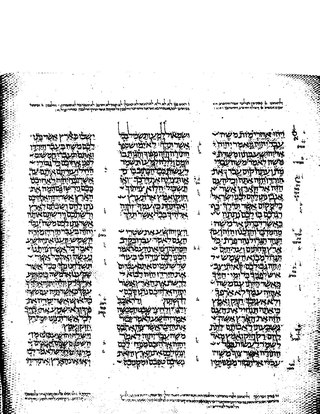
Joshua 15 is the fifteenth chapter of the Book of Joshua in the Hebrew Bible or in the Old Testament of the Christian Bible. According to Jewish tradition the book was attributed to the Joshua, with additions by the high priests Eleazar and Phinehas, but modern scholars view it as part of the Deuteronomistic History, which spans the books of Deuteronomy to 2 Kings, attributed to nationalistic and devotedly Yahwistic writers during the time of the reformer Judean king Josiah in 7th century BCE. This chapter records the allotment of land for the tribe of Judah, a part of a section comprising Joshua 13:1–21:45 about the Israelites allotting the land of Canaan.
